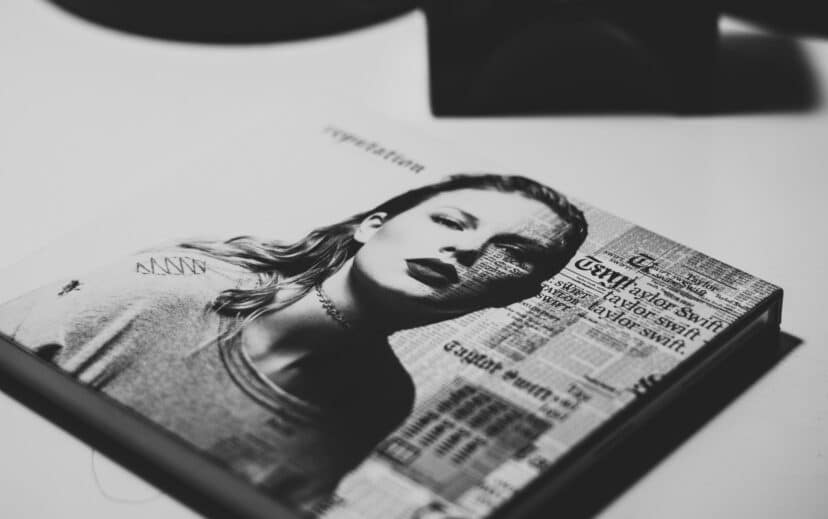If you’re a megastar songwriter and recording artist like Taylor Swift, there’s a 100% chance you’ll be sued repeatedly for copyright infringement over your chart-topping hits. For example, while Ms. Swift still has not been able to shake off the long-running suit over her 2014 hit, “Shake It Off,” she was recently hit with another copyright infringement action relating to the 2019 release of her , “Lover.” The lawsuit is curious for several reasons.
Why Is Swift Being Sued?
For one, the claims of copyright infringement have nothing to do with any of the songs on the album. Rather, the lawsuit filed on August 23, 2022 in the Western District of Tennessee by plaintiff Teresa La Dart alleges that Taylor took copyrightable elements from Ms. La Dart’s 2010 poetry anthology, entitled “Lover”. Specifically, Swift — without credit or authorization from La Dart — appropriated elements of La Dart’s front and back cover into her book, entitled “Lover,” which was included with physical copies of the album. Notably, Ms. La Dart does not claim that any portion of her poems were purloined by Ms. Swift and incorporated into the text of the “Lover” companion book.
Instead, the crux of the complaint is that Taylor used copyrightable elements of the front and back cover: photo poses of the respective books and the nature of the arrangement of photographs and accompanying text — but again, not any of Ms. La Dart’s words themselves. The complaint, at a mere five pages, is scarce on details regarding the alleged infringements. The allegations are mostly contained in paragraph 8:
The Swift and [Taylor Swift Productions] TSP “Lover” book as released and published by Swift and TSP and claiming all creative credits for Swift, as well, includes, at least, i) substantially the same format of a recollection of past years memorialized in a combination of written and pictorial components within a book, ii) with a substantially similar cover format, with the author photographed in a downward pose, and color scheme (pastel pinks and blues) with the same title (again, “Lover”), iii) with substantially the same introduction page formats with a similarly styled “Lover” title, as well as an earlier photograph of the author in a nature setting and turned to the right and an accompanying forward with substantially similar greetings and wishes for the reader, iv) with a substantially similar inner book design with interspersed photographs and writings throughout the body thereof, v) and with a substantially similar back cover format, with the author photographed in an upward pose (juxtaposed with the front cover pose), and, again, a substantially similar color scheme (pastel pinks and blues), all in comparison with the creative elements of the [Teresa La Dart] TLD Work designs owned by TLD in total, as well as protected by TLD’s Registered Copyright (comparisons provided in Exhibit B).
Key Copyright Concepts to Consider
Application of key copyright concepts suggests this case should be kicked out of court. First, as recently pointed out in a post about an infringement lawsuit filed against Mariah Carey over her holiday evergreen, “All I Want for Christmas Is You,” titles are not copyrightable. Second, as noted in the Carey article, to prove a claim of copyright infringement, a plaintiff has to prove that the defendant a) had access to plaintiff’s work and b) that defendant’s work is “substantially similar” to plaintiff’s.
To show substantial similarity, La Dart must show that Swift either i) copied protectable (i.e., copyrightable) elements of her book or ii) copied a copyrightable selection and arrangement of non-copyrightable elements from plaintiff’s . Merely peppering your complaint with the phrase “substantial similarity” is not enough.
Third, copyright law primarily protects unique of concepts or ideas. Copyright Act Section 102(b) specifically states that “[i]n no case does copyright protection for an original work of authorship extend to any idea, procedure, process, system, method of operation, concept, principle, or discovery, regardless of the form in which it is described, explained, illustrated, or embodied in such work.” For example, the idea of a tragedy about star-crossed lovers has been expressed a myriad of ways for centuries and is free for anyone to use, with Pyramus & Thisbe, Romeo & Juliet and West Side Story exemplifying different expressions of the same concept or idea.
There Is Likely No Similarity of Copyrightable Material Between the Two “Lover” Books
Ms. La Dart’s infringement claims appear to rely on allegations of a copyrightable arrangement of otherwise non-copyrightable elements. However, such arrangements must be original to the plaintiff. This brings up another copyright concept, called “scenes-a-faire,” which is best explained by example: one can’t claim copyright in a Western for a scene where the high-hatted hero rides off on horseback into the sunset. That’s just a staple of the genre. What Ms. La Dart is describing regarding the arrangement of photographs and text sounds like a basic scrapbook.
And as for the alleged similarities in the respective front and back photographs, you may decide for yourself. Compare Ms. Dart’s cover photos to the cover photo for Ms. Swift’s book and album. And, while copyright law Chapter 313.4(K) protects “an original combination or arrangement of colors if it results in a pictorial, graphic, or sculptural work that qualifies as an original work of authorship,” there does not seem to be anything original in the use of “pastel pinks and blues” — which are commonplace for romantic book covers — or the downward facing poses of the respective writers.
Publicity, not Victory?
If the purpose of filing plaintiff’s brief complaint is to drum up publicity for her poetry, then she has succeeded spectacularly. But if Ms. La Dart has her heart set on a million-dollar payday from Ms. Swift, she may be looking at the heartache of having her complaint dismissed like a jilted lover.
Have questions about a copyright claim?
If you or someone you know has a question about a potential copyright claim, speak to an attorney to ensure you are taking the necessary steps to avoid violating copyright law. Contact a member of our team for next steps.





